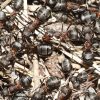 A tractor removes a dead sargassum from the shore in Capesterre de Marie-Galante, Guadeloupe. Photo: Olivier Morin/AFP via Getty Images
A tractor removes a dead sargassum from the shore in Capesterre de Marie-Galante, Guadeloupe. Photo: Olivier Morin/AFP via Getty Images
France is to build a seven-kilometer floating barrier to protect its Caribbean overseas islands from an «unbearable» tide of brown stink algae.
Martinique and Guadeloupe are overshadowed by miles of sargussum, brown floating algae that have filled the water and coastline and give off a strong smell of rotten eggs.
Bérenger Couillard, France's Environment Minister, visited Guadeloupe this week to see the effects of seaweed in person and described them. as «unbearable for the local population».
“This is the first time I have smelled this. I know the suffering this causes to the people of Guadeloupe every day,” she told AFP.
 the help of networks. on Martinique. Credit: Olivier Morin/AFP via Getty Images
the help of networks. on Martinique. Credit: Olivier Morin/AFP via Getty Images
To address this problem, authorities will build a seven-kilometer (4.3-mile) floating barrier in Le Petit-Coul-de-Sac-Marin, she said. It will consist of three parts, the first part will be installed by September 2023.
Experts first noticed the rapid growth of sargassum in the Atlantic Ocean about five years ago.
Scientists believe that global warming, deforestation, sewage filled with sewage and agricultural waste are to blame.
In some areas, it makes swimming impossible and poses a health hazard as it contains heavy metals and arsenic.
Martinique experts recently warned that after two days at the seaside, «large amounts of toxic gas» were generated, including including hydrogen sulfide and ammonia. The risk was «potentially fatal hypoxic pulmonary, neurological and cardiovascular damage.»
Algae is also contaminated with the banned pesticide Chlordecone, which has been used on banana plantations for decades.
In Martinique, locals are struggling with algae invasion with a huge three-kilometer net that prevents the algae from reaching the shore, and a special boat collects up to 100 tons per hour before they have time to rot.


























































Свежие комментарии